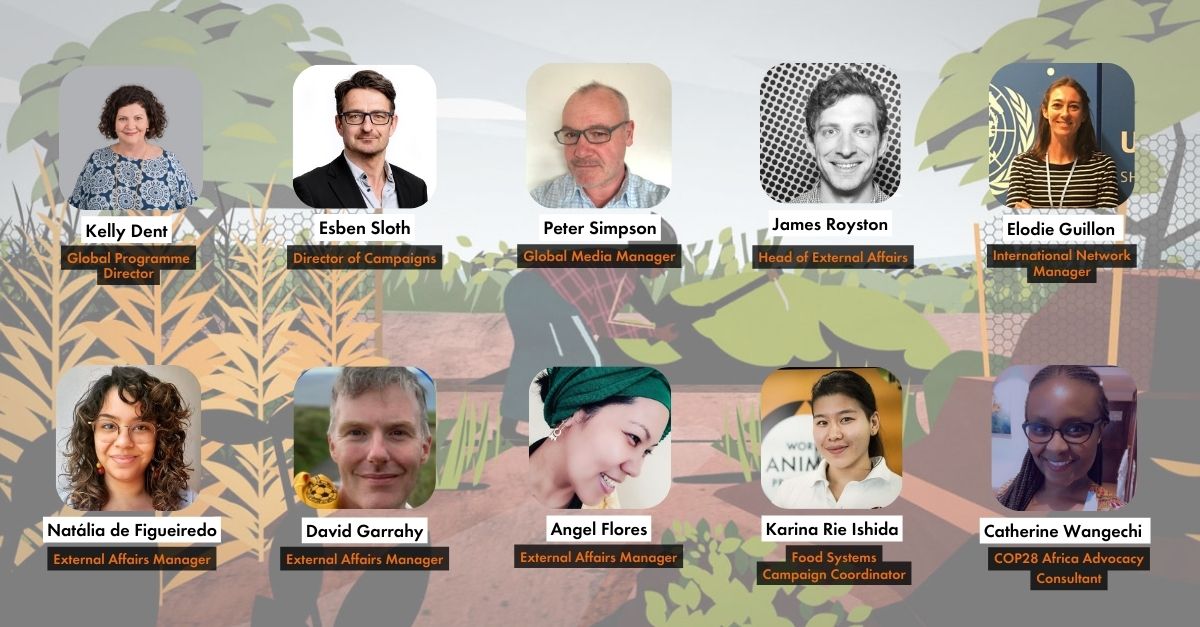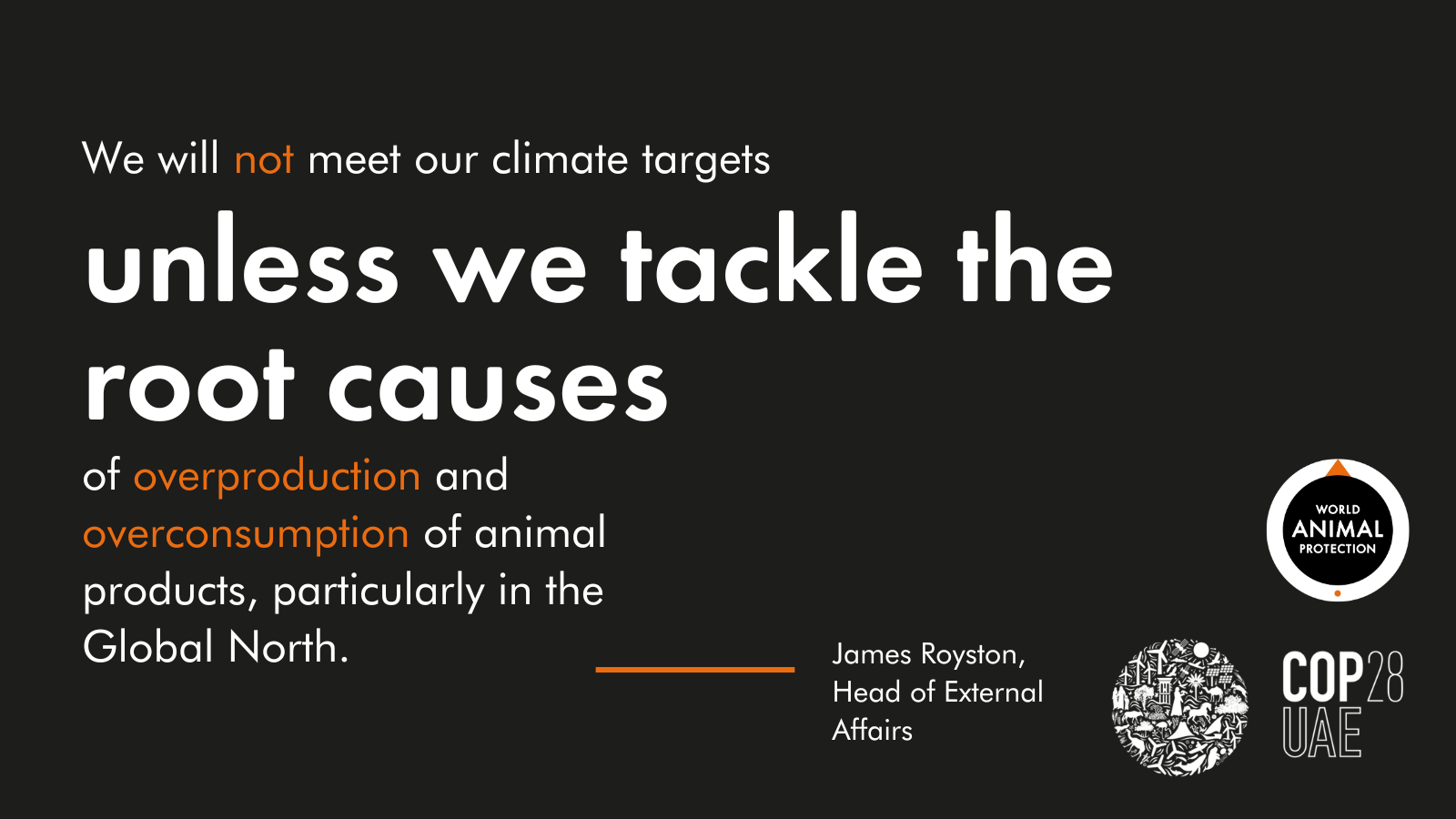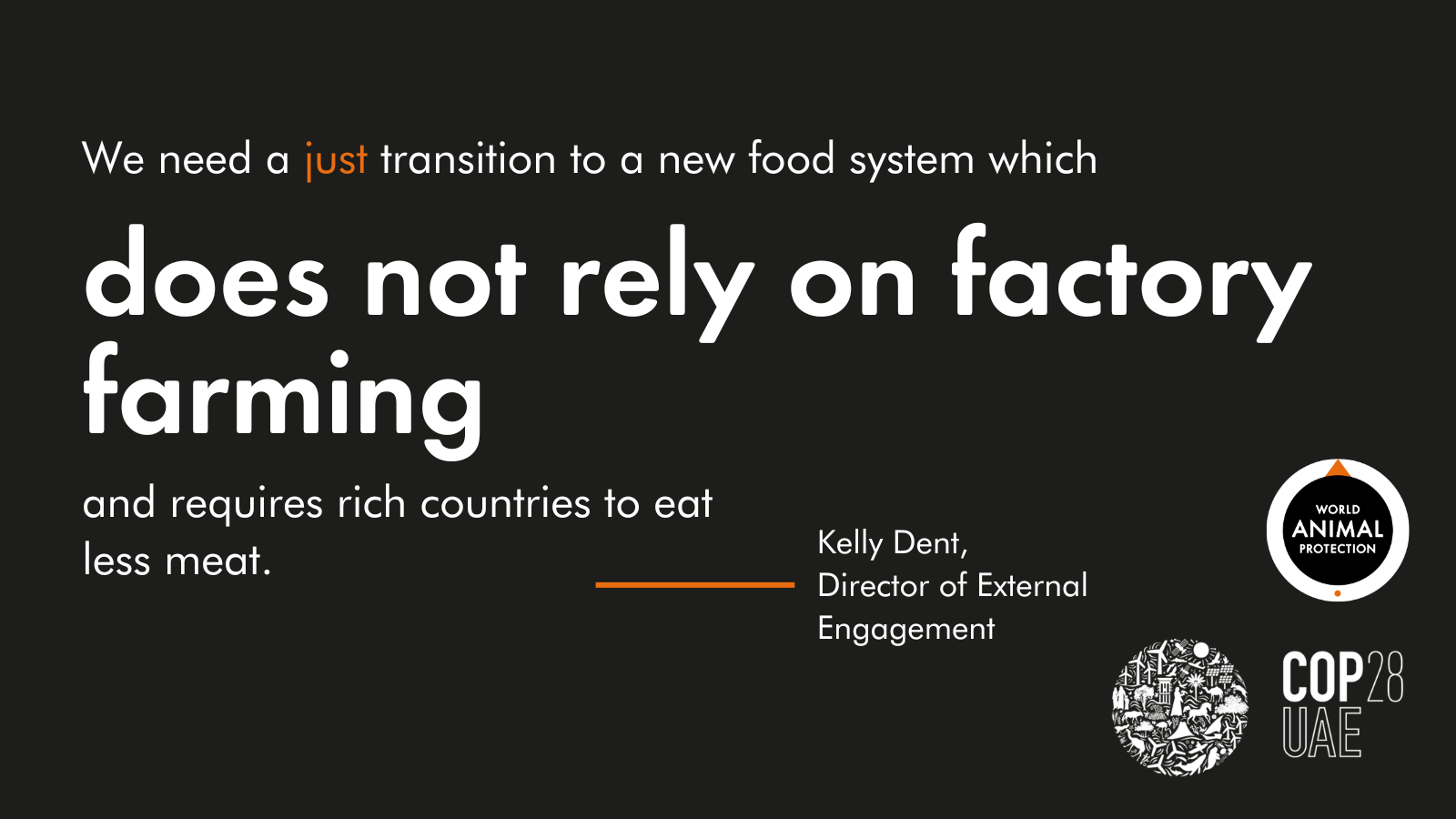
COP28 Highlights from World Animal Protection
News
Read the COP28 highlights from the World Animal Protection delegates from their experiences at this year's climate summit in Dubai.
COP28 took place from November 30th to December 12th 2023, and saw global activists and representatives congregate in Dubai to address the challenges our people, animals, and climate face.
World Animal Protection was present and held several side events to highlight the damage industrial farming causes.
Ten delegates touched ground to advocate for animals and the need to end industrial factory farming.
Our representatives were:

A new groundbreaking report highlighted the devastating connection between factory farming and carbon emissions and was presented in the talk: Unveiling Industrial Farming's Hidden Climate Destruction.
This event examines the urgent need to establish the Loss and Damage Fund committed to at COP27. We will explore how to hold the world’s biggest industrial animal agriculture companies responsible for the loss and damage associated with climate induced weather disasters in the Global South.
Speakers included:
- Sulaimon Arigbabu, Executive Secretary at HEDA Resource Centre (he/him)
- Nnimmo Bassey, director of the ecological think-tank, Health of Mother Earth Foundation (he/him)
- Lamine Diatta, Senegalese Negotiator for Agriculture (he/him)
- Kelly Dent, Global Programme Director of External Engagement (she/her)
COP28 Side Events
World Animal Protection, ProVeg International and Upfield co-hosted the Food4Climate Pavilion.
Several side events were held to discuss different environmental aspects:
Reducing Deforestation and Industrial Farming - A Climate Win-Win
It is impossible to eliminate deforestation without tackling one of the major root causes – industrial animal agriculture’s unabating consumption of animal feed. This side event investigates how curbing this disaster loop for the climate can help radically reduce greenhouse gas emissions.
Speakers included:
- Rodrigo Agostinho, President of IBAMA (Brazil) (he/him)
- Glenn Hurowitz, Founder of Mighty Earth (NGO) (he/him)
- Natália Figueiredo, External Affairs Manager of World Animal Protection Brazil (she/her)
A Just Transition Away From Industrial Animal Agriculture
Whilst the concept of Just Transition is often discussed in the energy and transport sectors, transitioning away from industrial animal agriculture gets less attention. Accelerating a Just Transition in the agriculture sector is essential to meet the targets of the Paris Agreement.
What does a Just Transition away from industrial animal agriculture systems look like? Hear from a coalition of organisations who have identified 3 levers to make this crucial transition for the climate.
Speakers included:
- Sena Alouka, Togo Negotiator for Agriculture (he/him)
- Sune Kirkegaard Rotne, Official from Denmark Climate Ministry (he/him)
- Mia MacDonald, Executive Director of Brighter Green (she/her)
- Angel Flores, International External Affairs Manager, World Animal Protection (she/her), moderator
Unpacking the Emirates Declaration: Is Industrial Farming Overlooked?
In light of COP28 and the Leaders’ Declaration on Resilient Food Systems, Sustainable Agriculture and Climate Action: we will critically examine whether the Declaration’s goals can be achieved if we continue to overlook emissions from industrial animal agriculture.
Speakers included:
- Mark Driscoll, Founder & Director, Tasting the Future (he/him)
- Dr. Helen Harwatt, Senior Research Fellow, Chatham House (she/her)
- Kaltham Ali Kayaf, Director of Animal Development & Health Department, UAE Ministry of Climate Change and Environment (she/her)
- Sena Alouka, Togo Negotiator for Agriculture (he/him)
- Kelly Dent, Global Programme Director of External Engagement, World Animal Protection (she/her)
- James Royston, Global Head of External Affairs, World Animal Protection (he/him), moderator
Key Moments
Over the course of COP28, key moments emerged which sparked broader conversations around the environmental impact of factory farming.
Responding to the UN Food and Agriculture Organisation’s (FAO) Roadmap published at COP28, James Royston, World Animal Protection’s Head of External Affairs, said:

“Though the FAO Roadmap contains positive changes to global food systems, including improved emphasis on animal health, it is in but name a defence of the existing big agrifood producers, whose flawed food systems are in large part to blame for the climate emergency the world faces.
“Changes to the livestock industry and more sustainable methods of farming are welcomed - but the emphasis on so-called modernisation of agrifood systems through technological advances falls far short of what we require. We needed wholesale change and cannot afford any more delay.
“World Animal Protection is alarmed at the number of false solutions proposed, including methods like using methane inhibitors. These will not solve the fundamental problem of our over-reliance upon industrial farming, which relies on deforestation and has a large carbon and cruelty footprint which is bad for animals and humans.
“We will not meet our climate targets unless we tackle the root causes of overproduction and overconsumption of animal products, particularly in the Global North.
“The Roadmap as it stands does not acknowledge the need to drastically reduce our dependence on unsustainable meat and dairy products.
“World Animal Protection will continue to work with our partners and the FAO to ensure the changes expected of the food system are fit for purpose and achieve the climate goals we must secure.”
COP28 Round Up
While we applaud the spotlight placed on food and agriculture for the first time at COP28, without a commitment to change the way we produce food, the lives of billions of humans and animals are in jeopardy.
We will continue to work with governments, institutions, civil society and the private sector to keep food transformation on the table.
